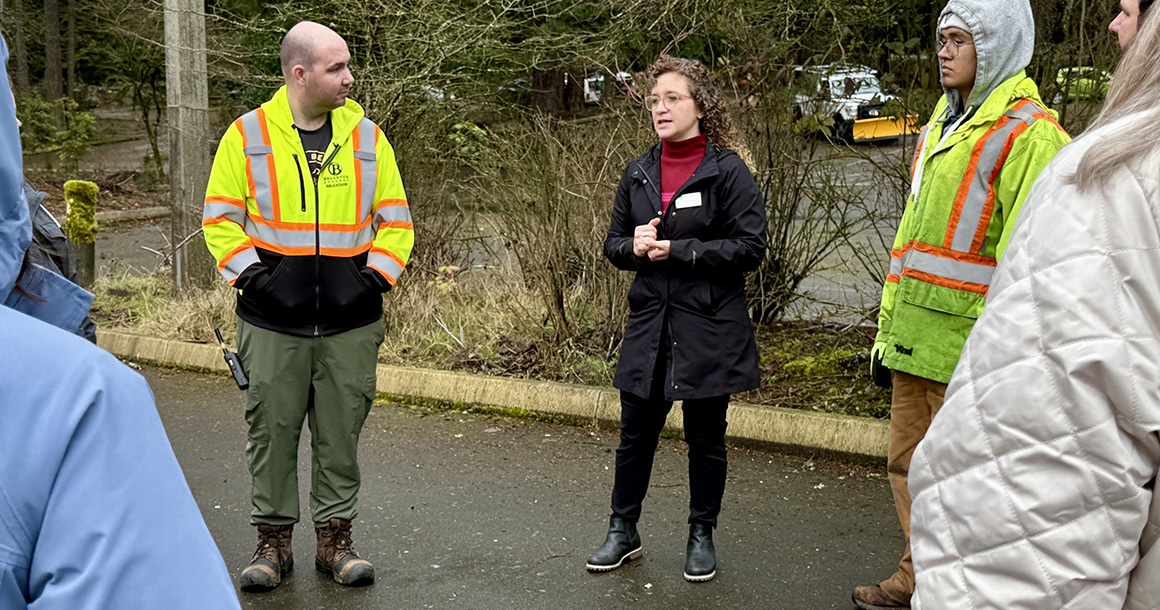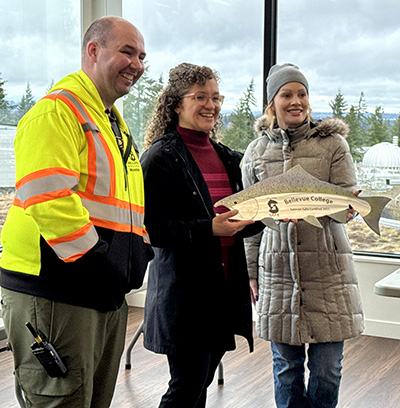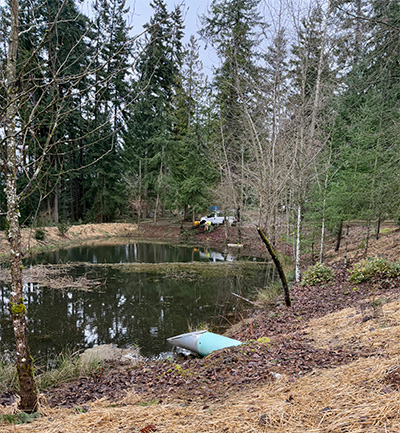College Receives Salmon-Safe Certification for Stormwater Management
Apr 8, 2025With many species of salmon throughout the Pacific Northwest on the decline, Bellevue College was recently acknowledged for its efforts to slow this trend through stormwater management practices that work to protect the local watershed.

With many species of salmon throughout the Pacific Northwest on the decline, Bellevue College was recently acknowledged for its efforts to slow this trend through stormwater management practices that work to protect the local watershed.
The college recently received a Salmon-Safe Certification from one of the leading ecolabels in the country, Portland, Oregon-based Salmon-Safe.
“There are a lot of reasons for (the decline in salmon populations), whether it’s culvert sizes, dams, stream temperatures, or pollutants in our waterways,” Sara Holzknecht, Bellevue College’s director of the Office of Sustainability, said. “So a lot of what Salmon-Safe focuses on is slowing stormwater coming into these waterways, and passing through biofiltration.”

While this comes about two years after Holzknecht and her associate director Elissa Gordon decided to apply for the certification, Holzknecht said many of the pieces that allowed them to become certified had already been in place for a long time—something the Salmon-Safe team remarked on during their site visit in summer 2024.
“We have many stormwater filtration assets on our campus,” Holzknecht, who has been at Bellevue College for about two years, said, acknowledging the work of those who came before her. “So I think it’s the result of good planning in the past, including a large number of rain gardens, and a bioswale in the R Building parking lot. The campus is almost 100 acres of urban forest, and so having many native plants is also really helpful to this filtration.”
Introducing the Compost BURrito
According to its website, Salmon-Safe is a peer-reviewed certification and accreditation program focused on implementing farming practices and developments that protect water quality, maintain watershed health and restore habitat. The program also requires institutions to continue to improve their stormwater management throughout the five-year certification.
And for Holzknecht and her office, part of that ongoing stormwater management work has been compost BURritos, whose name stands for bio urban retrofit device.
“It’s basically a big sock that is full of a mix of compost and sand,” Holzknecht said. “And when stormwater passes through this mix, it’s been found that the compost filters out a variety of heavy metals from the stormwater, as well as 6PPD-quinone on or 6PPD-Q, which is a tire additive.”
While Salmon-Safe isn’t focused specifically on heavy metals or 6PPD-Q—but rather more comprehensive best practices for good stormwater management—she said when the latter gets worn off tires and onto roadways, and eventually into the waterways, it’s been found to be lethal, especially to coho salmon populations. Which is why filtering out 6PPD-Q has been a big focus of the stormwater management work at Bellevue College.
“We’re very excited to contribute to that, as the latest estimate is there are around 100,000 pounds of tires left on roadways annually in the state,” Holzknecht said. “It’s little particles coming off the tires when you brake, so any amount of friction, wears off a little bit of the tire, and that’s washing away into the watershed.”
Bringing People Together
The compost BURritos were installed in the southeast corner of campus in October 2024, which she said was a project that also included more than 70 students, as well as Bellevue College’s grounds crew and a local Boy Scout troop. They all worked together to remove invasive plants such as the Himalayan blackberries that had taken over the area, plant native plants, and install several compost BURritos. In addition, clearing out the invasive plants also revealed a pond that had previously been hidden by the wall of blackberries, Holzknecht said.
“It’s a whole new space. Elissa saw a deer there one of the days that we were there, and there are ducks in the pond. It’s something where students can come and see how things grow and change over time. It’s very visible, which is very satisfying,” she said. “Holistically speaking, it’s all habitat restoration.”

These volunteer work parties have been Holzknecht’s favorite part of the Salmon-Safe Certification work because they bring people together in a special way and get them talking while they get their hands dirty. These events also contribute to the curriculum as some faculty bring their classes.
The Salmon-Safe Certification doesn’t come with additional funding or grants, but Holzknecht sees it as a feather in their cap for seeking out new grant funding, which will help give them a good pathway for continuing their stormwater management work. But more importantly she said, environmentally speaking, given the bigger picture of regional salmon decline, it’s important for public institutions like Bellevue College to be a leader in raising awareness on the issue and to do their part in reducing contaminants entering the watersheds.
“The other side of it is that we’re experiencing changes in stormwater as a result of climate change. We’re having sudden, high-intensity rain events,” Holzknecht said. “Are our stormwater systems ready to respond to that increased amount of rain? So some of these features, like rain gardens that were thoughtfully put into place previously, will help in those storm events…There otherwise might be risk of increased flooding damage to our buildings, and so there are also very real benefits to good stormwater management, beyond the environmental ones, that will save the college money in the long term.”
Learn more about Bellevue College’s Office of Sustainability and its Climate Action Plan.
